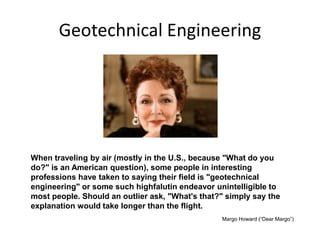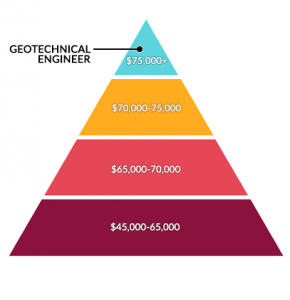The Single Strategy To Use For Geotheta

A geotechnical engineer is a specialized civil engineer that concentrates on the habits of dirt, rock, and other products discovered underneath the Earth's surface area. They use scientific concepts and engineering methods to evaluate the properties and habits of these materials to sustain the secure and reliable layout, building, and upkeep of facilities tasks.
They conduct website examinations, accumulate samples, perform laboratory examinations, and evaluate information to review the suitability of the ground for building and construction jobs - Tailings Engineer. Based on their findings, geotechnical designers offer recommendations for foundation layout, slope stability, retaining frameworks, and reduction of geotechnical risks. They work together with various other specialists, such as designers, architectural engineers, and construction groups, to guarantee that geotechnical considerations are incorporated into the overall task design and execution
By evaluating the actions and buildings of soil and rock, they can determine prospective geotechnical dangers such as landslides, dirt settlement, or incline instability. Their expertise aids stop failures or crashes that might jeopardize lives and property. Below are some thorough responsibilities and duties of a geotechnical designer: Site Investigation: Geotechnical designers conduct site examinations to collect information on subsurface problems.
They translate the information to understand the residential properties and habits of the dirt and rock, including their stamina, leaks in the structure, compaction features, and groundwater problems. Geotechnical Analysis and Style: Geotechnical engineers analyze the data accumulated throughout site examinations to examine the stability and viability of the site for construction tasks. They execute geotechnical calculations and modeling to assess factors such as birthing capacity, settlement, incline security, side earth pressures, and groundwater flow.
Not known Facts About Geotheta
Foundation Layout: Geotechnical engineers play an essential role in designing structures that can securely support the designated framework. They analyze the soil conditions and load needs to establish the ideal foundation type, such as superficial structures (e.g., grounds), deep structures (e.g (https://experiment.com/users/geotheta)., heaps), or specialized methods like dirt enhancement. They take into consideration variables such as negotiation limits, birthing capacity, and soil-structure interaction to create ideal foundation layouts
They evaluate building plans, monitor site activities, and conduct field evaluations to verify that the design suggestions are adhered to. If unexpected geotechnical concerns emerge, they examine the scenario and supply suggestions for removal or modifications to the layout. Threat Analysis and Reduction: Geotechnical designers assess geotechnical dangers and threats linked with the task site, such as landslides, liquefaction, or dirt disintegration.

Cooperation and Communication: Geotechnical designers function closely with various other professionals associated with a task, such as architects, architectural designers, and building and construction teams. Reliable interaction and collaboration are important to integrate geotechnical considerations right into the total job style and building process. Geotechnical engineers offer technical proficiency, answer queries, and make sure that geotechnical needs are fulfilled.
The Greatest Guide To Geotheta
Here are some kinds of geotechnical designers: Foundation Engineer: Foundation engineers focus on developing and assessing foundations for structures. They evaluate the soil conditions, load demands, and website qualities to identify the most appropriate foundation type and style, such as superficial foundations, deep structures, or specialized techniques like heap structures.
They examine the variables influencing incline stability, such as soil properties, groundwater conditions, and slope geometry, and establish techniques to stop incline failings and reduce risks. Quake Designer: Earthquake designers concentrate on examining and creating frameworks to withstand seismic pressures. They analyze the seismic threat of a site, assess dirt liquefaction possibility, and establish seismic layout requirements to make certain the security and strength of frameworks throughout quakes.
They execute area screening, accumulate examples, and assess the accumulated data to characterize the soil residential or commercial properties, geologic developments, and groundwater conditions at a site. Geotechnical Instrumentation Engineer: Geotechnical instrumentation designers concentrate on tracking and measuring the actions of dirt, rock, and structures. They mount and maintain instrumentation systems that keep track of aspects such as soil settlement, groundwater degrees, incline activities, and structural variations to examine performance and supply early cautions of prospective problems.
Our Geotheta Statements
They tend to be investigative individuals, which suggests they're intellectual, introspective, and analytical. They are curious, systematic, sensible, analytical, and logical. Some of them are additionally social, suggesting they're kind, generous, participating, person, caring, helpful, understanding, sensible, and friendly. Does this noise like you? Take our complimentary occupation examination to learn if geotechnical designer is among you can check here your top occupation matches.
In the office setting, geotechnical engineers utilize specialized software application devices to execute calculations, create layouts, and analyze data. They prepare records, evaluation project specs, communicate with customers and team members, and coordinate job tasks. The workplace setup offers a conducive setting for research study, evaluation, and collaboration with other experts associated with the job.
Geotheta Can Be Fun For Everyone
They frequently go to job sites to carry out website investigations, evaluate geotechnical problems, and gather data for evaluation. These sees entail traveling to various places, sometimes in remote or difficult terrains. Geotechnical designers may carry out soil tasting, conduct examinations, and display building and construction tasks to make certain that the geotechnical aspects of the project are being carried out appropriately.
Geotechnical engineers additionally work in specialized geotechnical laboratories. Geotechnical research laboratory engineers work extensively in these environments, managing testing tools, running instruments, and recording information.
Comments on “Geotheta - Truths”